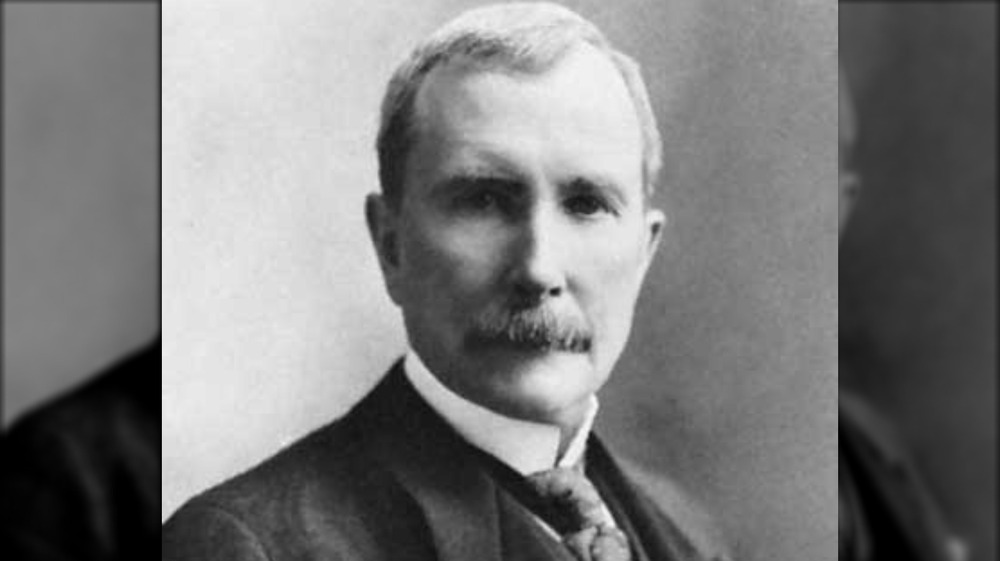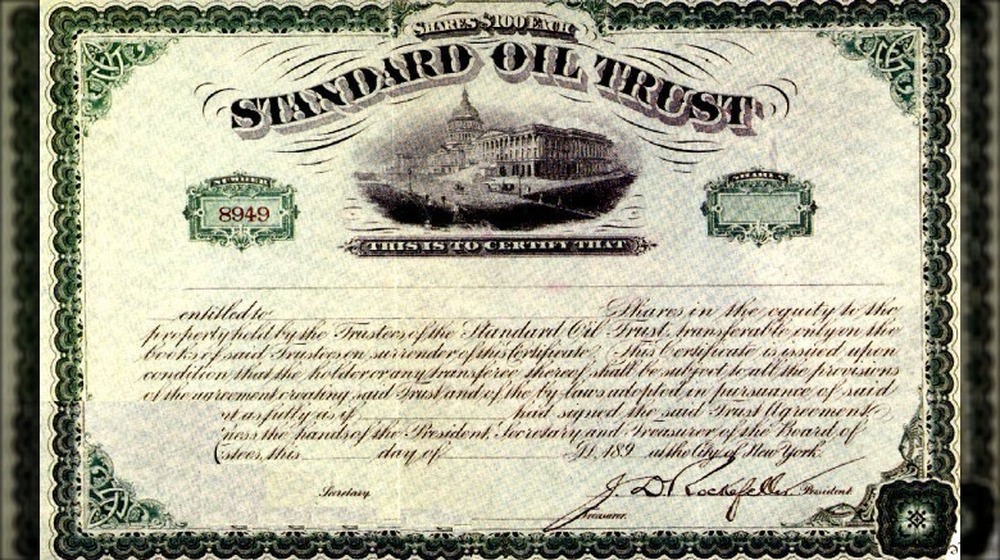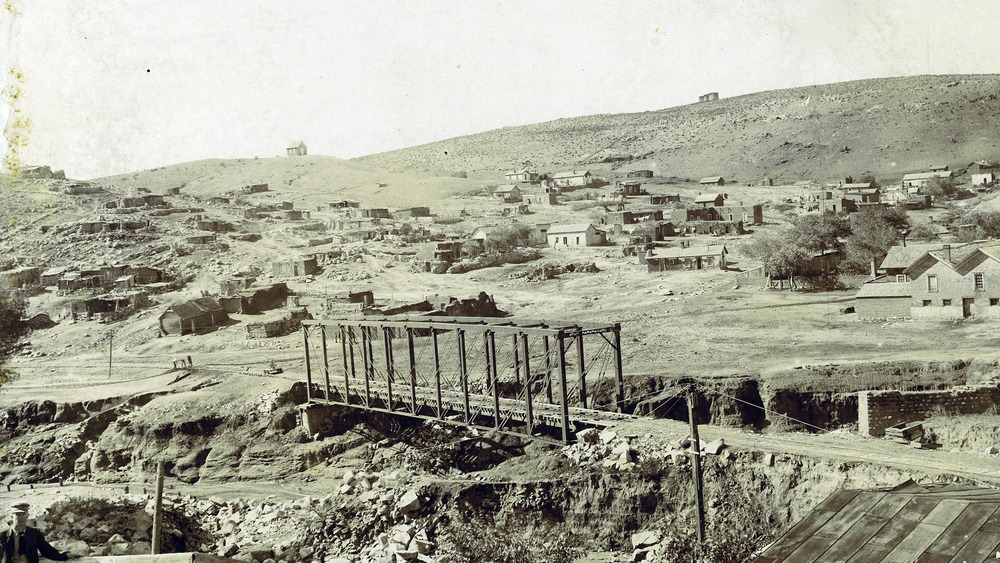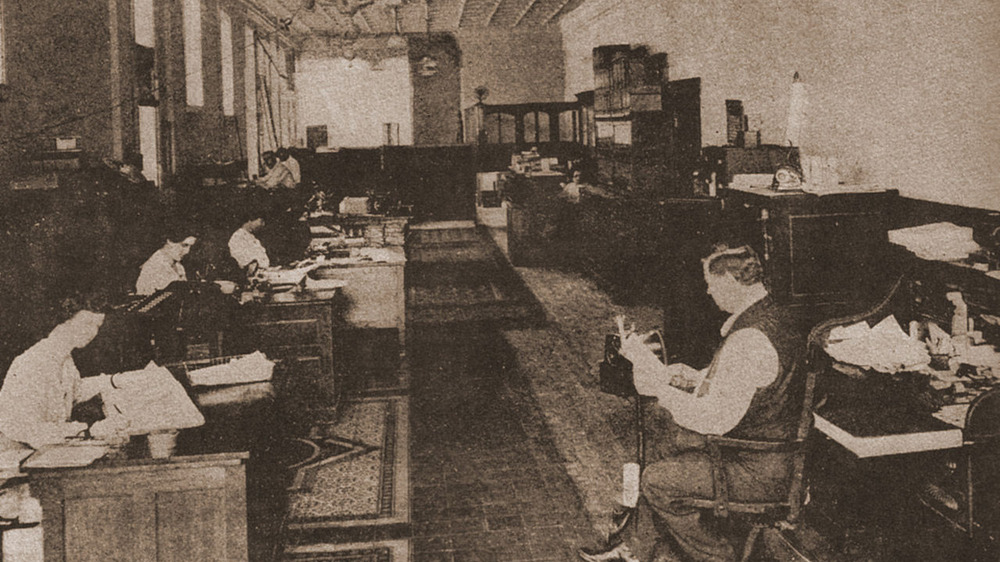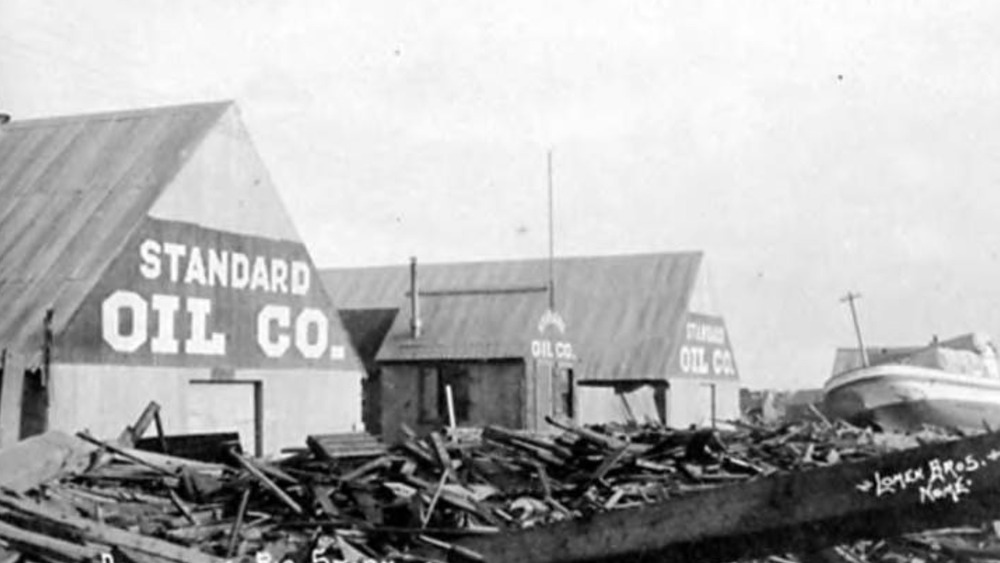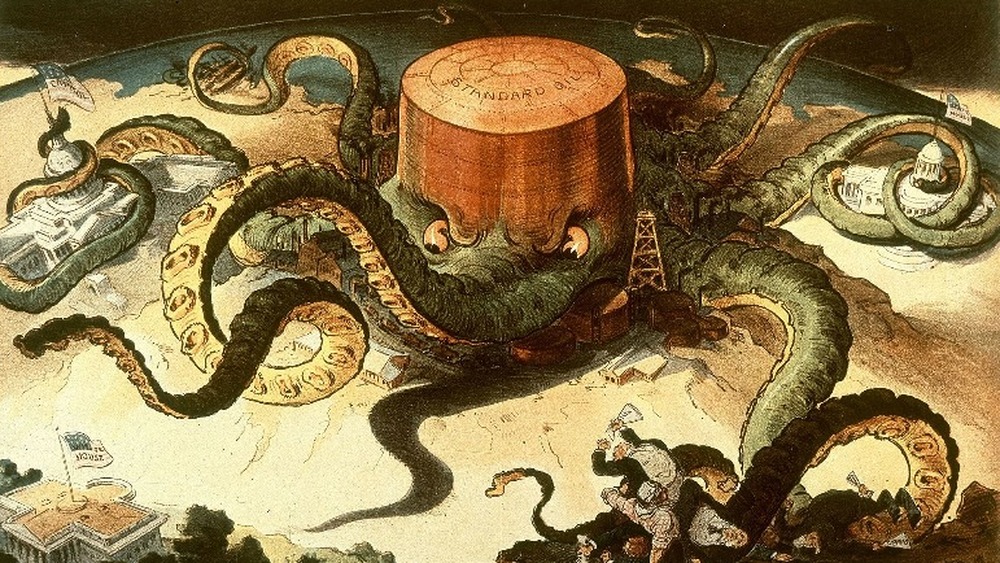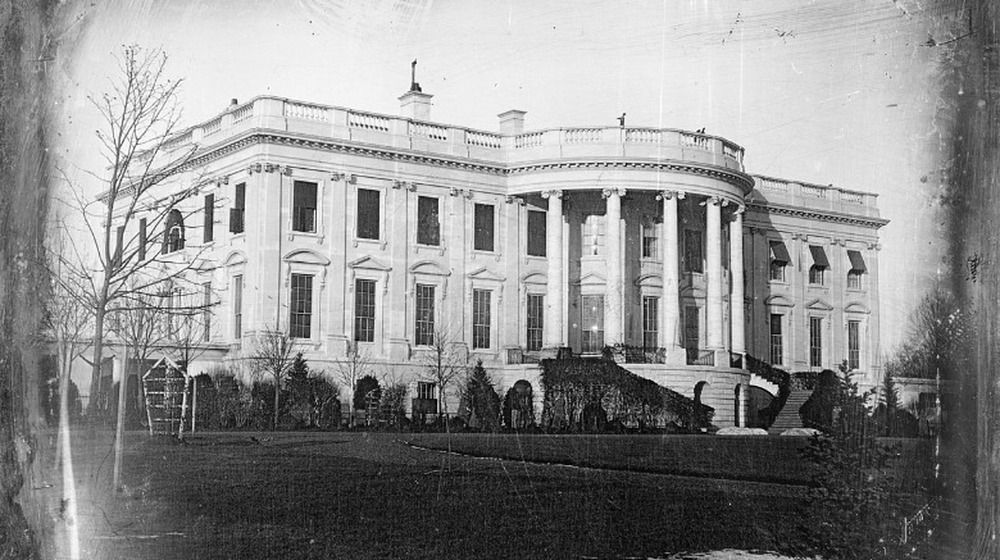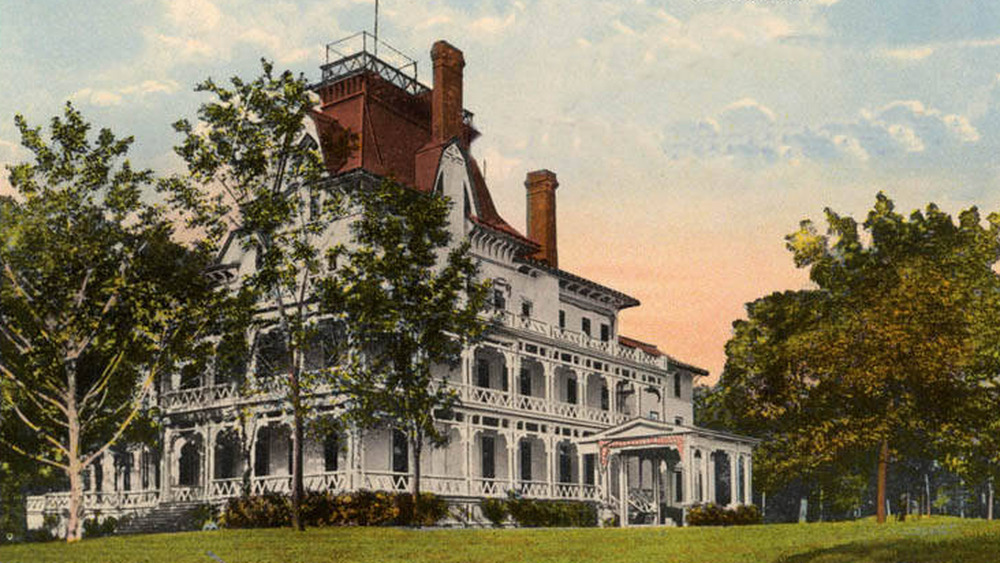How The Rockefeller Family Really Got So Rich
The Rockefeller family is really, really rich. Not the richest family in America anymore — more like the 23rd richest in the country as of 2018 — but let's be real. They still have a lot of money, and no one can really deny that.
All that said, they aren't quite as influential or monumental as they would've been in the past. Through the 1900s, the Rockefellers were at the top of the list of America's richest families, and with notable politicians and businessmen among their ranks, could pretty easily be found sharing tables with foreign leaders of the day.
Of course, it's not like the family has seen a fall from grace by any means — they're still quite prominent, just in a different way — but how they got to where they are is a story. And it's one that starts in the Industrial Age of the 1800s, when John D. Rockefeller would launch the family fortune.
John D. Rockefeller saw the possibilities of the oil industry
Talking crude oil in the 21st century is definitely something of a sticky subject. Pollution and climate change are very much associated with fossil fuels, and so the view on things like the oil industry isn't exactly great. Back in the mid-19th century though, things were really different.
Oil was on the cusp of changing the world, about to alter American society forever. According to FEE, oil deposits had already been something that most people knew about and considered a vague nuisance (or maybe a small-time business venture). But scientific research into oil — particularly into distilling it — really changed that. Purifying crude oil yields kerosene, the perfect fuel for lamps and lanterns (and a lot better than the whale oil that was common at the time). Suddenly, kerosene was the hottest commodity, especially in Pennsylvania, where the oil industry was really taking off.
That's where John D. Rockefeller came onto the scene. Living in Cleveland, Ohio at the time (via Biography), he was close enough to Pennsylvania to take part in — and expand — the growing oil industry, but mostly, he saw problems that needed fixing. Already a businessman with a keen eye for detail, he knew he could change the industry and just how he could make his mark.
Buying out the competition and vertical integration
Look, in a way, it's not like it's all that hard to be the best in your field when there just isn't any kind of competition. Granted, getting to that point is an entirely different thing, but the mid-1800s was the Wild West of big business. Antitrust and anti-monopoly policies hadn't really come around yet, and Standard Oil really took advantage of that environment.
According to Biography, within two years of opening, John D. Rockefeller was running the biggest oil refinery in the local area, and by 1870, he started up the Standard Oil Company. The name wasn't unwarranted boasting; it only took him a couple years to buy out essentially all of his local competition. And some of his less-than-local competition, too. Within a decade of starting up a refinery, Rockefeller was at the head of the nation's first real monopoly, potentially running operations from coast to coast.
But it wasn't just a matter of owning all the refineries. Rockefeller took it one step further with vertical integration (owning every single part of the oil refining process, rather than just owning a ton of refineries). He began to buy wood, with Standard Oil making its own barrels for shipping, rather than spending more money to buy barrels (via FEE). The same went for pipes to transport oil; Rockefeller owned those, too. He even began hiring his own chemists to start looking into better ways to refine oil and reduce waste.
Rockefeller cut costs and looked for opportunity
Sure, there's a whole bunch out there about John D. Rockefeller and Standard Oil having a monopoly on the oil industry and how that would've led to success, but another big part of it is just Rockefeller's approach toward getting into the oil industry in general.
He was always on the lookout for ways to save money, and part of that had to do with the way oil is refined. As FEE says, at the time, the main product of the refining process that people were interested in was kerosene, but it was only about 60 percent of the products from refining. The rest included gasoline, other chemicals, and tars which most people just threw out. But Rockefeller saw opportunity instead, hiring chemists to find a use for those other byproducts: gasoline was another fuel, tars could be used for paving, and the other chemicals were sold for use in various products (like oils and paraffin).
Basically, he was willing to spend the time and research to make something out of nothing. Rockefeller also bought oil fields and ore deposits that other leaders in the industry thought were pretty much a waste of time. And what happened with that? He ended up proving everyone else wrong, these plots of lands turning huge profits for him in the long run.
Standard Oil's unbeatable offers
There are a couple quotes that can be attributed to John D. Rockefeller when it comes to his goals with Standard Oil, and they pretty much boil down to offering the best products at the cheapest price (via FEE). And honestly? That's exactly what he did. Before he entered the scene and optimized the process of oil refining, prices for oil hovered around 58 cents to the gallon (even though it'd been as high as $13.75 during the Civil War). But just a couple years after he started up Standard Oil and began buying out the competition, that price had already dropped down to 30 cents (via FEE). And that wasn't the end; in about 15 years, it was down to eight cents.
Obviously, that annoyed his competition, but it thrilled the rest of the population. Working-class people could suddenly light their homes for as low as one cent per hour. That's next to nothing, but it opened up an entire world of opportunity, giving people the chance to actually do more things after dark. So it's really no surprise people were turning to Standard Oil.
But this same idea went past just customers; Rockefeller used the same idea to really put pressure on his competition by working directly with railroads. He'd make them offers to ship his oil at rates that nobody else could even dream of matching, getting himself incredibly profitable deals in the process.
Rockefeller was surprisingly fair
There's this image that tends to permeate the entire idea of this Gilded Age in the mid-19th century: the picture of the greedy boss who overworked and underpaid his workers to an inhumane degree. To be fair, that's not wrong; this point in history is filled with social issues left and right, with working-class people almost always getting the short end of the stick.
John D. Rockefeller was kind of an anomaly in that structure, though. When it came to the workers in his factories, he would actually pay them a significantly higher wage than pretty much any of his competition would offer (via FEE). He was known for being liberal with praises and surprisingly gentle with criticisms, and would actually do work alongside his employees, rolling up his sleeves and loading barrels into wagons early in the morning (via FEE). It won him a lot of respect.
And his managers loved him, too, for offering things like extended, fully-paid vacations, allowing them to take as much time away as they might need at no threat of losing their position. Basically, he cared more about his people and valued their ideas, rather than only their hours on the job; if his employees were well-rested and happy, they could contribute more. Which is exactly what happened: his men were eager to do their best for the company, and for their leader who trusted them so much.
Standard Oil went past just the US
Standard Oil is generally associated with the US, and a lot of its business was handled domestically, but not all of it. John D. Rockefeller wanted to make a splash internationally, too, and he was willing to go to great lengths to make sure he succeeded.
He'd started expanding Standard Oil's reach into other countries in both Europe and Asia, offering the same sort of quality that was offered to American markets, though that didn't mean he wasn't met with competition. Russia had entered the market, too, and with massive advantages (via FEE). Russia being, well, Russia, meant that access to those European and Asian markets came a lot easier to them than any American company — just a trip over land rather than shipping overseas. And Russian oil fields could produce more oil than American ones in Pennsylvania or Ohio (about 60 times more, on average).
Still, Rockefeller was determined to win. He found new ways to make barrels, spending less while maintaining quality and hired engineers to refine the steamship tankers they used to transport the oil, cutting shipping costs. Then he sent people overseas to study foreign markets, just to tailor his product to those markets. He even dropped prices to nearly five cents a gallon, barely turning a profit, all to hold onto his foreign markets (pretty successfully, in the end).
Rockefeller found ways to circumvent laws
Generally speaking, the American government hasn't been especially okay with monopolies, and with Standard Oil becoming, as Biography puts it, the first major American monopoly, Rockefeller became something of an easy target. In the eyes of a lot of people, including Congress, Standard Oil was growing a little too much to be comfortable. (The same could be said of other companies at the time, though). That's where the Sherman Antitrust Act came into play. According to History, it was passed in 1890 to prohibit anything that restrained trade. Monopolies very much fell into that category, and so Standard Oil was deemed in violation of the law by the Ohio Supreme Court.
And so the company was dissolved... but not really. Sure, it was broken up and directly run by new management, but they were all still under Standard Oil's banner. The actual hierarchy of the higher-ups didn't change at all, so really, things weren't all that different. Rockefeller and the board could still run things.
That said, it wasn't all smooth sailing. Most of those branches were eventually put into one large holding company, which was also found to violate the Sherman Antitrust Act and broken down yet again. By 1911, Standard Oil was effectively gone and replaced by a bunch of smaller companies, like ExxonMobil, which the Rockefeller family would later own shares in (via Intelligencer).
The Rockefeller name and banking
It's pretty accurate to say that a lot of the Rockefeller family fortune was earned by John D. Rockefeller's success in the oil industry, but at the same time, he wasn't the only Rockefeller to make a name for himself. John D. Rockefeller's grandson, David Rockefeller, became a pretty well-known figure in the world of banking. As World Finance says, he took a job at Chase Manhattan Bank shortly after the end of World War II. The family already had shares of the company, but he was also able to prove his worth upon arrival, eventually becoming CEO in 1969.
Once there, he looked to expand the reach of Chase Manhattan, and the New York Times explains that he went out and met with heads of state around the world. Some looked at the travel and saw it as frivolous spending, but Rockefeller defended himself, saying it was improving the image of Chase Manhattan overseas. As it turns out, though, both were basically true. Chase Manhattan's international business soared, while its domestic performance was left in the dust, falling behind the competition.
The story didn't end there, though. By 1980, David Rockefeller and Willard Butcher had fixed the problems and doubled the earnings of Chase Manhattan. And it was under his advice that Chase built its huge headquarters near Wall Street, the investment ultimately leading to work on the World Trade Center project.
The Rockefellers and Wall Street
The Rockefeller name ended up touching quite a few different fields, and not just the oil industry. That was especially true when it came to John D. Rockefeller's grandsons, one of whom — Laurance Rockefeller — ended up becoming a force on Wall Street and a pioneer of venture capitalism (via World Finance). Basically, stocks and investing and stuff.
His first big step into this world came with the founding of Eastern Airlines, which he ended up holding the largest share of stock in within just a few years (all the while being associated with another aircraft company, according to Britannica). But World War II put all of that on hold. Afterwards, investing became the name of the game for him. He took part in a pretty wide range of different investments, most of them falling into scientific and technological fields. (Seriously, the fields that he invested in sound super cool — composite materials, thermionics, nuclear power, and a bunch more, which the Rockefeller Archive Center lists. If you were into science, he really seemed to be your guy).
And he was really good at what he did, able to see just what the next big thing would be. Some proof of that: he made early investments into Apple and Intel. AKA: some of the biggest names in the world of electronics now. That really seems to speak for itself.
The political pull of the Rockefellers
The grandsons of John D. Rockefeller really did get heavily involved in American society, so maybe it's not all that surprising that some of them ended up in the political scene.
Nelson and Winthrop Rockefeller were the two brothers who did get embroiled in politics. According to Biography, Nelson Rockefeller had always been incredibly ambitious, even as a kid, and by 1940 he'd been noticed by President Franklin D. Roosevelt. From there, he campaigned for the presidency multiple times (unsuccessfully) while also serving four terms as the governor of New York. And that's where he left his mark, building up the New York skyline through construction projects (via World Finance), while focusing on education, welfare, and the arts. Shortly before his death, he also served as vice president under Gerald Ford.
Winthrop Rockefeller also made contributions on the political landscape, albeit from Arkansas rather than New York. He'd settled there for a change of scenery and began his own businesses, but ended up getting involved in the politics of the area, revitalizing the two-party system and then becoming governor for two terms from 1967 to 1971 (via the Rockefeller Archive Center). Under his watch, Arkansas saw reforms made to its penal system and reorganization of the government structure, as well as other changes, like the state's first minimum wage and opening official meetings to the public.
The dissolving of Standard Oil helped the Rockefellers
Alright, so making money is one thing, but keeping it is another entirely. After all, the Rockefellers aren't the only family descended from Gilded Era Industrialists, but they are one of the few who have kept their fortunes. (For comparison, the Vanderbilt family fortune is basically gone.)
So how does the family hold onto its fortune, listed as $11 billion as of 2016? David Rockefeller, Jr. explained the family secrets in an interview on CNBC. The big thing is just the fact that the family sticks together. They hold regular meetings multiple times a year, where they can talk about the future and what their plans are, but it's also a time for them to just stay closely knit and remember who they are, where they come from. They also share core family beliefs, keeping everyone united.
A big reason why that all works, though, is because Standard Oil was dissolved back in 1911. The Rockefellers have technically been out of the oil business for over a century, and they have no central company. It's one less thing to fight over — no one has to get into arguments over who gets the business and who doesn't. It can't drive them apart — which Rockefeller says has been the case for other families in similar positions — and their money has been passed down through trusts and stocks instead, which has caused a lot fewer legal problems.
So much philanthropy
Okay, yes, philanthropy is sort of the opposite of making money, but it's also been a really big part of the Rockefeller family legacy that can't really be ignored, and it's a lot of what they've been involved in over the past century.
Philanthropy has been, in effect, a tradition of the Rockefeller family since the days of John D. Rockefeller himself. Deeply religious, he was already donating parts of his paycheck to churches (via World Finance), and then after his retirement, he donated over half a billion dollars to various different causes (via History). That included funding the University of Chicago, the Rockefeller Institute of Medical Research (now Rockefeller University), and creating the General Education Board to promote higher education for all. And all that aside from the Rockefeller Foundation, which has donated millions to just about every kind of charitable cause you could name — science, the arts, education, public health, and so on.
And his descendants have continued the tradition. The Rockefeller Family Fund was created a couple generations later to continue promoting the family's philanthropy, and has since become a public charity that gives largely to social and environmental causes. Wait, environmental causes? Well, yes, they've since come face-to-face with the source of their wealth, as Intelligencer says, and pulled their support from ExxonMobil, one of the biggest descendants of Standard Oil, instead favoring investments in renewable energy and research into ExxonMobil's part in climate change.
